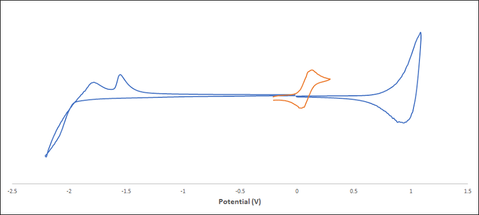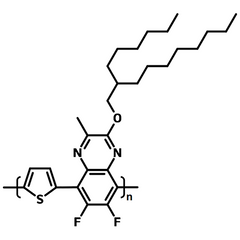PTQ11, with better hole transport capability than PTQ10
Low cost, high purity polymer available online for fast, secure dispatch
PTQ11 is a wide bandgap copolymer alternating electron withdrawing quinoxaline and electron donating thiophene units as the backbone. Comparing to the low cost polymer donor PTQ10, PTQ11 shows stronger molecular crystallization tendency and better hole transport capability.
Wide bandgap copolymer
For high efficient OPV applications
Luminosyn™
High purity, batch-specific GPC data, available larger batch orders and higher molecular weight
Worldwide shipping
Quick and reliable shipping
Green energy materials
Processable in non-halogenated solvents
With zero HOMO offset, non-fullerene polymer solar cells (NF-PSCs) based on PTQ11:TPT10 active layer shows highly efficient exciton dissociation and hole transfer, showing highly efficient device performance achieving PCE of 16.32% with a higher VOC of 0.88 V, a large JSC of 24.79 mA cm−2, and a high FF of 74.8% with the following device structure.
Device structure: ITO (indium tin oxide)/ZnO/PTQ11−TPT10/MoO3/Ag [1]
| Thickness (nm) | VOC (V) | JSC (mA cm-2) | FF (%) | PCE (%) |
| 110 nm | 0.88 | 24.79 | 74.8 | 16.32 |
Luminosyn™ PTQ11
Luminosyn™ PTQ11 is now available.
High purity
PTQ11 is purified by Soxhlet extraction with methanol, hexane and chlorobenzene under an argon atmosphere
Batch-specific GPC data
Batch specific GPC data is always available for your thesis or publication
Large-quantity orders
Plan your experiments with confidence with polymers from the same batch
General Information
| Full name | Poly[(thiophene)-alt-(6,7-difluoro-2-(2-hexyldecyloxy)-3-methylquinoxaline] |
| Synonyms | PTQ11 |
| Chemical formula | (C29H38F2N2OS)n |
| CAS number | n.a. |
| Absorption* | λmax 548 nm, 590 nm in film (as-cast film from PTQ11 in chlorobenzene solution) |
| HOMO / LUMO | HOMO = -5.52 eV, LUMO = -2.76 eV, Eg = 1.92 eV [1] |
| Solubility | o-xylene, chloroform, chlorobenzene and dichlorobenzene |
| Processing solvent | o-xylene, chloroform, chlorobenzene |
| Classification / Family | Organic semiconducting materials, Wide band-gap polymers, Organic Photovoltaics, Polymer solar cells, NF-PSCs, All-polymer solar cells (all-pscs), Green energy materials. |
* Measurable with an optical spectrometer, see our spectrometer application notes.
Chemical Structure

Characterisations
UV-Vis Absorption

Cyclic Voltammetry

The cyclic voltammograms (CV) measurements were recorded on Ossila Potentiostat by using a three-electrode system with platinum disc as the working electrode, platinum wire as the counter electrode, Ag/Ag+ electrode as the reference electrode with a scanning rate of 100 mV/s in a 0.1 M tetrabutylammonium perchloroate Bu4NClO4) solution. The potential of Ag/Ag+ reference electrode was internally calibrated by using ferrocene/ferroncenium (Fc/Fc+) as the redox couple.
MSDS Documentation
Pricing
| Batch | Quantity | Price |
| M2277A1 | 100 mg | £380 |
| M2277A1 | 250 mg | £760 |
| M2277A1 | 500 mg | £1300 |
| M2277A1 | 1 g | £2500 |
| M2277A1 | 5 g / 10 g* | Please enquire |
* Lead time of 4-6 weeks.
Batch details
| Batch | Mw | Mn | PDI | Stock Info |
| M2277A1 | 69,889 | 36,558 | 1.91 | In stock |
Literature and Reviews
- High Efficiency Polymer Solar Cells with Efficient Hole Transfer at Zero Highest Occupied Molecular Orbital Offset between Methylated Polymer Donor and Brominated Acceptor, C. Sun et al., J. Am. Chem. Soc., 142, 1465−1474 (2020); DOI: /10.1021/jacs.9b09939.
- Achieving Fast Charge Separation and Low Nonradiative Recombination Loss by Rational Fluorination for High-Efficiency Polymer Solar Cells, C. Sun et al., Adv. Mater., 31, 1905480 (2019); DOI: 10.1002/adma.201905480.

 PTQ11 MSDS sheet
PTQ11 MSDS sheet